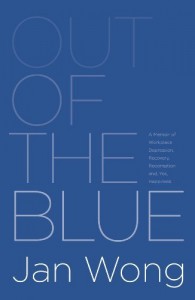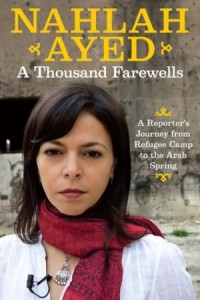A Thousand Farewells: A Reporter’s Journey from Refugee Camp to the Arab Spring
By Nahlah Ayed
Published by Viking, 356 pages, $32
Out of the Blue: A Memoir of Workplace Depression, Recovery, Redemption and, Yes, Happiness
By Jan Wong
Self-Published, 263 pages, $21.99
 Despite many Canadians’ knee-jerk damnation of the print media, two new books prove beyond a doubt that journalists’ courage exists and that honest reporting can have a powerful effect upon readers.
Despite many Canadians’ knee-jerk damnation of the print media, two new books prove beyond a doubt that journalists’ courage exists and that honest reporting can have a powerful effect upon readers.
Both Nahlah Ayed, who works for CBC news, and Jan Wong, now a former employee of the Globe and Mail, tell their stories in a direct and personable way. Both books demonstrate that standing up for oneself in the face of trouble is crucial to self-respect and good reportage. It is neither fair nor relevant to ascribe different layers of heroism to either woman. Both face challenging circumstances and are able to write clearly and decisively about their situations.
Ayed, now in her early 40s, was born in Winnipeg and grew up comfortably there, one of four children of Palestinian descent. Thanks to her mother, she became fluent in Arabic, which became a powerful tool in her career when she joined the CBC in 2002. Since then she has reported from Iraq, Lebanon, Egypt, Syria, Libya and Afghanistan. Talking to Ayed as I did recently in Toronto (I taught her years ago when I was a journalism professor at Carleton University) is like taking a vitally compressed short course in Middle Eastern history and politics. She’s a beautiful, soft-spoken woman with a spine of steel. Ayed says in her book’s Acknowledgements that her work as a reporter has “always been about trying to understand,” and that comes across clearly in her careful and honest narrative.
Despite her youth, Ayed truly is an “old hand” when it comes to the Middle East. Her family lived – by choice, as a way to reconnect with their culture – in a Palestinian refugee camp in Amman, Jordan, when Ayed was a child, and her tenure in war reporting began with the First Gulf War. She’s reported at all the conflicts leading up to and including the Arab Spring. Although her publisher wanted Ayed to write a fully personal memoir, the reporter resisted because she rightly believes the story is about the people she interviews, not herself. There are glimpses of what sort of a woman Ayed has become – feminist, principled, consumed by her job, steely under pressure but still capable of fear – but this is definitely a far cry from a tell-all. And that’s as it should be: Ayed may be off to a posting in London in the short-term, but she will continue to cover the world’s volatile places indefinitely.
“When I look back now,” Ayed writes towards the end of A Thousand Farewells, “the Middle East is often just a blur of guns and violence, of explosions and assassinations, of breaking news bulletins and conspiracy theories playing endlessly in my mind.” Despite that, she has managed to deliver a book of great humanity, one that reminds us that human beings – with the same flaws and flesh as the rest of us – inhabit those troubled places. “I always marveled,” she says, “that anyone would care to talk to us in the midst of so much turmoil, and yet they did, the hundreds of people I met and interviewed over the years . . . “ That they did is, I suspect, tribute to Ayed’s tenacity and compassion.
Even though Ayed’s reports have filtered relentlessly into Canadians’ living rooms for the past decade, Jan Wong is possibly the better-recognized journalist of the two, partly because she is nearly two decades older, with four previous books, and partly because of her famous/infamous “lunch with” column that everyone read in the Globe and Mail when she still worked there.
Wong’s dispute with her former employer — and her almost-publisher Doubleday — is complicated, but she outlines it crisply in Out of the Blue. Her inimitable brand of sardonic humor sparks the narrative as she tells of her own oblivious slide into depression, her battle with the Globe and its insurance company, and her subsequent recovery and new life. This may well be one of the most polished and professional “self-published” books you’ll ever read, but one would expect nothing less from the indomitable Wong. She says she’s invested over $30,000 in the venture, a sum that would give many writers pause. But in the first month of publication, she’s
already garnered more reviews and publicity than many senior authors receive even when touted by a prestigious publisher.
As Wong notes wryly, conflict and controversy always help to sell stories. But I would say Wong deserves whatever success this book brings her: she’s faced down the Dragon Despair, she’s stood up to a pusillanimous set of managers and she’s managed to write coherently about two of life’s most devastating experiences: falling prey to extreme depression and being fired.
Kudos to Ayed and Wong: proof that well-honed words can triumph over violence and corporate self-interest.

